Having worked in our Writing Center for nearly four years now, I've come across an incredibly diverse student population with widely differing needs. Though the Writing Center has existed as a concept on our campus for a couple of decades and has been in its current location for almost ten years, we still occasionally struggle with proper accomodations.
Our center is located in the basement of the old library building. What was once a cubicle-cluttered group of offices has been opened up, renovated, and molded to our needs... for the most part.
One of the major problems with our facility was the Reading Center's annex. Pushed into half of a regular classroom-sized space, walled in on all sides with a too-narrow doorway and stuffed with large, round tables, the section worked great for staff Christmas parties, but was hardly ideal as a lab setting. About two years ago, one of the classroom walls was knocked down, opening up the space, and finally making it properly wheelchair accessible.
This, however, is only the most visible (and most costly) accomodation the center has undertaken. We have also changed in more subtle ways to better serve our student population.
One way of accomodating that is low-cost and highly-effective is to better educate tutors (and other staff that work with students) about specific kinds of disabilities and ways to address them. One site I have found particularly helpful in prepping our tutorial staff is this University of Washington-hosted site:
http://www.washington.edu/doit/MathSci/presen_accomm.html
Of especial interest is the section entitled "Specific Disabilities and Accomodations" which points out simple, effective solutions to addressing disabled student needs.
Disability is a spectrum, and Writing Center accomodations to disability should be a spectrum as well. Though it's of vital importance to meet the physical parameters of the ADA guidelines (which can be found here: http://www.ada.gov/), that shouldn't be where your accomodation strategy ends. Better educating your staff is a great way to increase your student accessibility as well as your professionalism.
Tuesday, April 6, 2010
Avoiding Learned Helplessness Part 3: Setting Goals, Long Term vs. Short Term
When a student first comes to tutoring, the tutor has no way of knowing whether this will be the student’s only visit or the beginning of a college career-length relationship. One way to help avoid engendering learned helplessness without “turning off” short term clients is to set specific goals.
· Identify: Figure out what the student’s greatest difficulty appears to be at the moment.
· Method: Once you’ve decided on a focus, determine the method for improvement and implement it.
· Short Term: Use the terminology as outlined in the student’s textbook. Concentrate on paper-level issues.
· Long Term: Remind the student that there are alternate terms that apply to the same ideas. Discuss how paper-level issues apply to bigger concepts.
· Lay the Foundation: Provide a long-term goal in addition to the immediate goal (triage). Don’t give the impression that all the student’s problems are fixed, but don’t act as if the student’s problems are insurmountable.
· Avoiding Dependence: By focusing on the short term “building block” approach—rather than an “all or nothing” impression—many learned helplessness issues can be avoided.
· Identify: Figure out what the student’s greatest difficulty appears to be at the moment.
· Method: Once you’ve decided on a focus, determine the method for improvement and implement it.
· Short Term: Use the terminology as outlined in the student’s textbook. Concentrate on paper-level issues.
· Long Term: Remind the student that there are alternate terms that apply to the same ideas. Discuss how paper-level issues apply to bigger concepts.
· Lay the Foundation: Provide a long-term goal in addition to the immediate goal (triage). Don’t give the impression that all the student’s problems are fixed, but don’t act as if the student’s problems are insurmountable.
· Avoiding Dependence: By focusing on the short term “building block” approach—rather than an “all or nothing” impression—many learned helplessness issues can be avoided.
Labels:
Ed,
Learned Helplessness,
Presentation 2010,
Setting Goals
Avoiding Learned Helplessness Part 2: Setting Boundaries
It is important for tutors to set clear boundaries, although they may vary somewhat from tutor to tutor because of personality, skills and style. Still, they need to be in accordance with the aims of the tutorial system and reflect the aims of the college or university, as well. Some areas to consider when setting boundaries are:
· Support: Tutors are there to give scholastic support to the student’s studies. Become aware of additional help available on campus or in the community.
· Availability: Set hours, session limits, know the availability of other tutors.
· Confidentiality: Understand the legal and moral reasons to respect confidentiality.
· Helpfulness: Clear, organized boundaries are helpful to model successful student behavior, reinforce the idea that the tutee has the responsibility for his/her own work, and assume that the student is capable of learning/developing as a writer.
· Confrontation: When necessary, a tutor must be able to confront a student who will not take responsibility for their work. Be compassionate and respectful without trashing professors or assignments.
· Support: Tutors are there to give scholastic support to the student’s studies. Become aware of additional help available on campus or in the community.
· Availability: Set hours, session limits, know the availability of other tutors.
· Confidentiality: Understand the legal and moral reasons to respect confidentiality.
· Helpfulness: Clear, organized boundaries are helpful to model successful student behavior, reinforce the idea that the tutee has the responsibility for his/her own work, and assume that the student is capable of learning/developing as a writer.
· Confrontation: When necessary, a tutor must be able to confront a student who will not take responsibility for their work. Be compassionate and respectful without trashing professors or assignments.
Labels:
Boundaries,
Learned Helplessness,
Presentation 2010,
Sue
Avoiding Learned Helplessness Part 1: Accomodating vs. Enabling
"Learned helplessness" is a psychological term that comes to us from disability studies. Though the idea has applications with all students, students who are registered with Disabled Student Programs & Services (and similar) come to tutoring with an added impediment to independence: the expectation of accommodation; yet these accommodations are important in order to help students and maintain compliance with the ADA. It’s vitally important to separate the idea of accommodating a student’s needs from enabling student dependence.
• Possession: Try to let the student have physical possession over their own work as much as possible.
• Choices: When you are in the position of “recorder,” don’t fill in the blanks: offer choices rather than answers.
• Resources: Discuss how to find the answer to something and guide the student through the process rather than giving an answer upfront.
• Approach: Try different approaches to material to address students who absorb knowledge differently. (i.e. kinesthetic learners, auditory learners, etc.)
• Review: Provide extensive session notes for the student to read on his or her own. These can be written, recorded, or e-mailed (for use with reader programs).
• Possession: Try to let the student have physical possession over their own work as much as possible.
• Choices: When you are in the position of “recorder,” don’t fill in the blanks: offer choices rather than answers.
• Resources: Discuss how to find the answer to something and guide the student through the process rather than giving an answer upfront.
• Approach: Try different approaches to material to address students who absorb knowledge differently. (i.e. kinesthetic learners, auditory learners, etc.)
• Review: Provide extensive session notes for the student to read on his or her own. These can be written, recorded, or e-mailed (for use with reader programs).
Tuesday, January 19, 2010
Another Year, Another Conference
It's that time of year again!
The RCC WRC Tutors have submitted the proposal and now we're hard at work on developing our new presentation:
"Stuck On You": Transitioning Students Toward Independence
Check back for updates.
The RCC WRC Tutors have submitted the proposal and now we're hard at work on developing our new presentation:
"Stuck On You": Transitioning Students Toward Independence
Check back for updates.
Monday, March 16, 2009
University of Calgary Grammar Tutorials
http://www.ucalgary.ca/UofC/eduweb/grammar/
Hey, guys.
Just wanted to direct you to one of my favorite Internet resources:
The Basic Elements of English: An Interactive Guide to Grammar is a great resource hosted by the University of Calgary. Using clickable links, this easy-to-use site provides detailed definitions, explanations, and examples that can provide a brush up for established students (or yourself) or provide an introduction for students newer to the grammar game. At the end of each tutorial is an interactive quiz that students can use to check their understanding and retention.
What are some of your favorite resources? Web-based or otherwise?
Hey, guys.
Just wanted to direct you to one of my favorite Internet resources:
The Basic Elements of English: An Interactive Guide to Grammar is a great resource hosted by the University of Calgary. Using clickable links, this easy-to-use site provides detailed definitions, explanations, and examples that can provide a brush up for established students (or yourself) or provide an introduction for students newer to the grammar game. At the end of each tutorial is an interactive quiz that students can use to check their understanding and retention.
What are some of your favorite resources? Web-based or otherwise?
Saturday, February 28, 2009
Pictures from the Conference
On Saturday, February 21st, the WRC tutors along with Lead Instructor Denise and Instructional Support Specialist James attended the 6th Annual SoCal Writing Centers Association's Tutoring Conference. Here are a few pictures from the day.
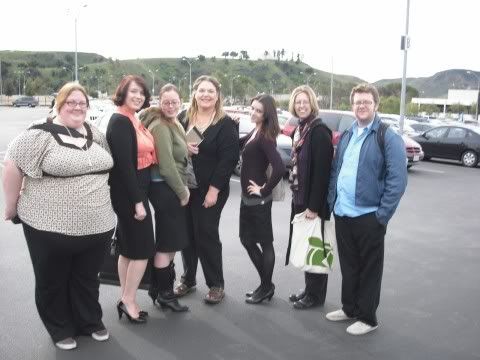
Tutors Bri, Alex, Heather, Sue, Megan, Lead Instructor Denise, and Tutor Mikey arriving at Moorpark College.
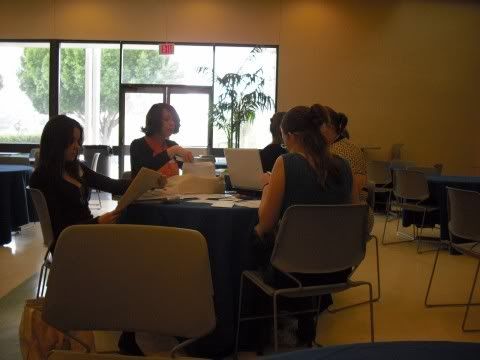
The tutors did a little last minute preparation during breakfast at Moorpark.
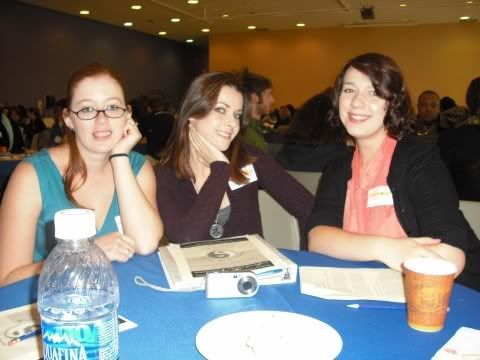
Heather, Megan, and Alex, however, still found time to pose for the camera.
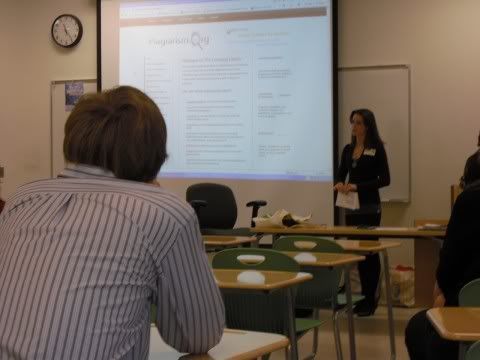
Tutor Megan started the presentation off by discussing Internet resources. (Look for her post on the topic below.)
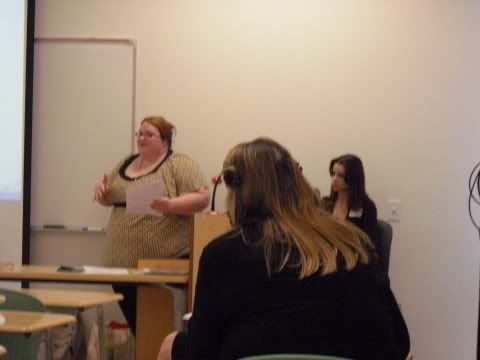
Tutor Bri discussed grammar podcasts with only slightly catastrophic technical difficulties. (Look for the post on grammar podcasts to learn more.)
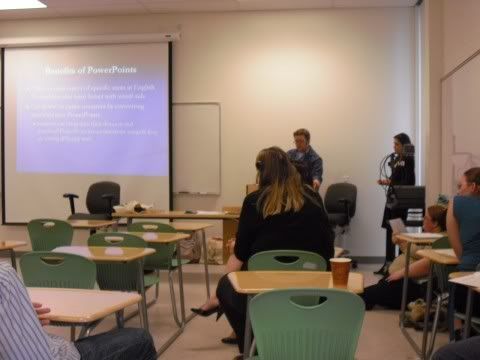
Tutor Mikey presented a PowerPoint about how to utilize PowerPoint presentations.
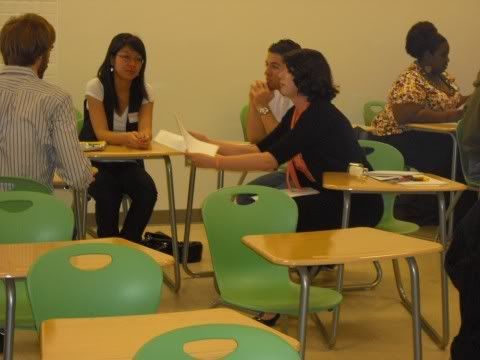
This is Tutor Alex leading one of the small group breakout sessions.
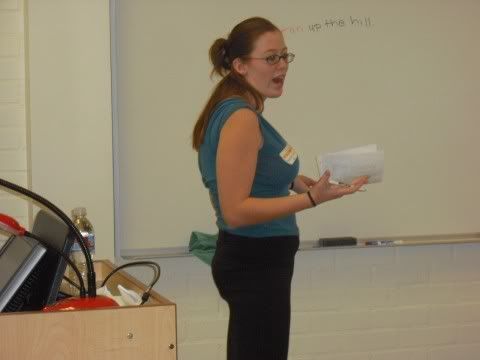
Tutor Heather talked about how to utilize whiteboards during her breakout session.
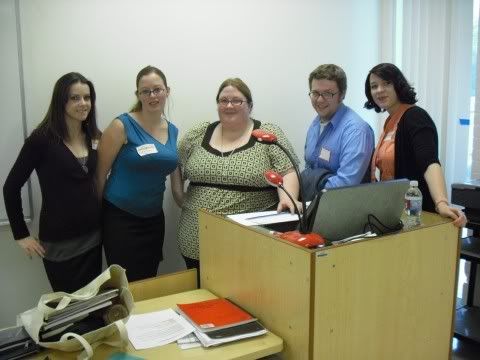
All in all, we felt we did pretty good.
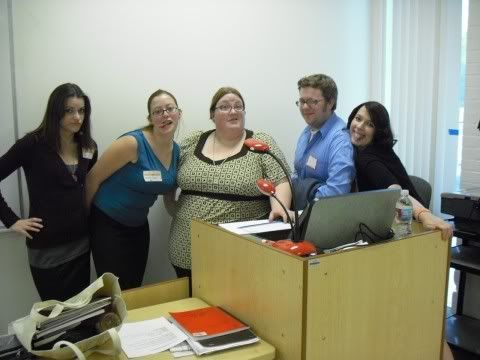
*dramatic pause* Or did we?! *cue foreboding music*

Tutors Bri, Alex, Heather, Sue, Megan, Lead Instructor Denise, and Tutor Mikey arriving at Moorpark College.

The tutors did a little last minute preparation during breakfast at Moorpark.

Heather, Megan, and Alex, however, still found time to pose for the camera.

Tutor Megan started the presentation off by discussing Internet resources. (Look for her post on the topic below.)

Tutor Bri discussed grammar podcasts with only slightly catastrophic technical difficulties. (Look for the post on grammar podcasts to learn more.)

Tutor Mikey presented a PowerPoint about how to utilize PowerPoint presentations.

This is Tutor Alex leading one of the small group breakout sessions.

Tutor Heather talked about how to utilize whiteboards during her breakout session.

All in all, we felt we did pretty good.

*dramatic pause* Or did we?! *cue foreboding music*
Sunday, February 22, 2009
Awesome Web-Resource Links!!
MLA Reference
http://www.nwmissouri.edu/library/CITING/MLA.HTM
This site provides helpful color coded examples of MLA citation. It also provides tabs you may click to Reference MLA style in an eassy, in text citations, and even how to use MLA with Government documents!
Grammar Reference
http://www.sparknotes.com/writing/style/
This site I found to be incredibly helpful due to its large A-Z archive of helpful grammar examples. This site is also fairly well known by students and is easy for them to use at home after you’ve shown it to them.
Help with Writing papers
Writing Help
http://essayinfo.com/
This is a great site because it can help you convey how to write different types of essays to the student. Often students don’t come to college with the knowledge of the different between a response paper and an argumentative one. This site tells you how to brainstorm and how to execute the writing process for each essay type. I liked that it didn’t provide any sample essays, because that may often lead to plagiarism. (watch out for any ads that sell pre-written essays on this site)!
Plagiarism
http://www.plagiarism.org/index.html
Although you may never use this site in a tutoring session (unless you're trying to discourage a student from plagiarizing), this site may be helpful for you, the tutor, to explore yourself. It provides information from the rules of plagiarism to even why many students plagiarize. I thought it was pretty handy.
Best Over All
http://owl.english.purdue.edu/owl/
This is the best over-all site. Almost everything listed above can be found here. However the draw back is that the site is HUGE! If you're going to use the Owl at Purdue site, please be sure to navigate the site on your own first. That way you'll save time trying to find anything during your session.
http://www.nwmissouri.edu/library/CITING/MLA.HTM
This site provides helpful color coded examples of MLA citation. It also provides tabs you may click to Reference MLA style in an eassy, in text citations, and even how to use MLA with Government documents!
Grammar Reference
http://www.sparknotes.com/writing/style/
This site I found to be incredibly helpful due to its large A-Z archive of helpful grammar examples. This site is also fairly well known by students and is easy for them to use at home after you’ve shown it to them.
Help with Writing papers
Writing Help
http://essayinfo.com/
This is a great site because it can help you convey how to write different types of essays to the student. Often students don’t come to college with the knowledge of the different between a response paper and an argumentative one. This site tells you how to brainstorm and how to execute the writing process for each essay type. I liked that it didn’t provide any sample essays, because that may often lead to plagiarism. (watch out for any ads that sell pre-written essays on this site)!
Plagiarism
http://www.plagiarism.org/index.html
Although you may never use this site in a tutoring session (unless you're trying to discourage a student from plagiarizing), this site may be helpful for you, the tutor, to explore yourself. It provides information from the rules of plagiarism to even why many students plagiarize. I thought it was pretty handy.
Best Over All
http://owl.english.purdue.edu/owl/
This is the best over-all site. Almost everything listed above can be found here. However the draw back is that the site is HUGE! If you're going to use the Owl at Purdue site, please be sure to navigate the site on your own first. That way you'll save time trying to find anything during your session.
Labels:
Essays,
Grammar,
Internet Resources,
MLA,
Plagiarism,
Presentation
Friday, February 20, 2009
On Grammar Podcasts
One category of grammar resources that is becoming more easily accessible via the Internet are grammar podcasts.
Grammar podcasts are a fairly new resource that greatly benefit auditory learners. Many also feature visual accompaniment that can benefit even more students.
Two podcasts we look at in our presentation on New Media are featured below.
Grammar Grater (http://minnesota.publicradio.org/radio/podcasts/grammar_grater/)
Grammar Grater comes from Minnesota Public Radio. Host Luke Taylor takes the listener through various skits and excerpts from literary and journalistic sources to cover the finer points of grammar. Some of the concepts Taylor reviews are for more advanced grammar students (looking at style conventions) while other posts are more for entertainment value (dissecting idiomatic expressions).
Though Grammar Grater posts transcripts of its episodes, it's primary value is as an audio resource.
Grammar Girl (http://grammar.quickanddirtytips.com/)
Mignon Fogarty's Grammar Girl from Quick & Dirty Tips, conversely, provides multivalent resources for all kinds of learners. Though the emphasis is on the auditory aspect, Fogarty provides additional cartoons, charts, and video to illustrate her points. To access the additional media, users must go to the transcript hosted at the Quick & Dirty site. The site is clearly written and easily searchable. Fogarty takes listener feedback and questions, often addressing listener questions directly in her episodes.
What makes Fogarty's podcasts so effective is that she offers tips and tricks that resonate with the listener. She often utilizes pop culture references and current events in her answers, making grammar issues relatable.
* * * * * *
As a tutor, it's important to remember that not all students learn things in the same way. Keeping on top of new trends--like podcasts--is one way a tutor can be more proactive in the Writing Center.
Grammar podcasts are a fairly new resource that greatly benefit auditory learners. Many also feature visual accompaniment that can benefit even more students.
Two podcasts we look at in our presentation on New Media are featured below.
Grammar Grater (http://minnesota.publicradio.org/radio/podcasts/grammar_grater/)
Grammar Grater comes from Minnesota Public Radio. Host Luke Taylor takes the listener through various skits and excerpts from literary and journalistic sources to cover the finer points of grammar. Some of the concepts Taylor reviews are for more advanced grammar students (looking at style conventions) while other posts are more for entertainment value (dissecting idiomatic expressions).
Though Grammar Grater posts transcripts of its episodes, it's primary value is as an audio resource.
Grammar Girl (http://grammar.quickanddirtytips.com/)
Mignon Fogarty's Grammar Girl from Quick & Dirty Tips, conversely, provides multivalent resources for all kinds of learners. Though the emphasis is on the auditory aspect, Fogarty provides additional cartoons, charts, and video to illustrate her points. To access the additional media, users must go to the transcript hosted at the Quick & Dirty site. The site is clearly written and easily searchable. Fogarty takes listener feedback and questions, often addressing listener questions directly in her episodes.
What makes Fogarty's podcasts so effective is that she offers tips and tricks that resonate with the listener. She often utilizes pop culture references and current events in her answers, making grammar issues relatable.
* * * * * *
As a tutor, it's important to remember that not all students learn things in the same way. Keeping on top of new trends--like podcasts--is one way a tutor can be more proactive in the Writing Center.
Welcome!
Welcome to the official blog of the Riverside Community College Writing and Reading Center's Tutors on the Riverside campus.
This site was begun to document work from and for our presentation at the SoCal Writing Centers Association's 2009 Conference at Moorpark College on Saturday, February 21st, 2009.
Please check back for updates, particularly after the conference.
This site was begun to document work from and for our presentation at the SoCal Writing Centers Association's 2009 Conference at Moorpark College on Saturday, February 21st, 2009.
Please check back for updates, particularly after the conference.
Subscribe to:
Posts (Atom)